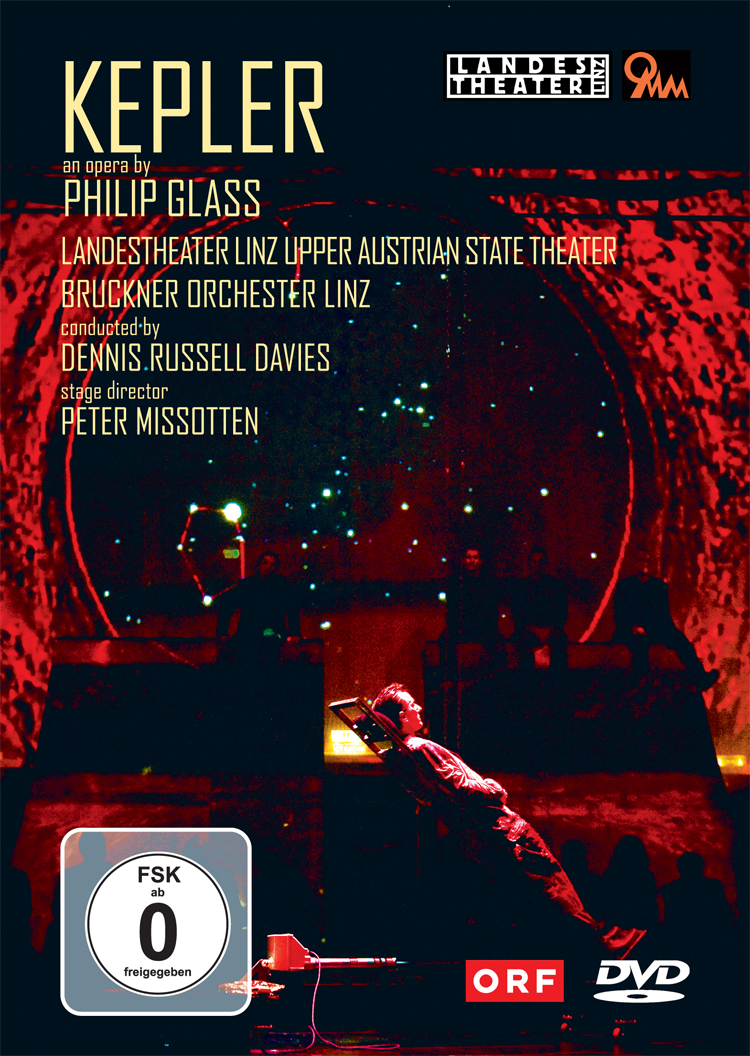
Info
Libretto by Martina Winkel.
Stage Director/Production and Set Design by Peter Missotten.
Synopsis
Gryphius: Auf die Nacht/Upon the Night
Kepler explains his scientific method and his intention of seeking to establish astronomy following the example of recognized sciences. He is convinced that heaven is not a place inhabited by “divine beings”, but rather a “clockwork” that can be scientifically explained. Kepler is certain that God created the human soul to enable scientific insight.
Gryphius: Vanitas! Vanitatum Vanitas
Further questions arise for Kepler: “But what, if Earth as well evaporates into the ether?” A principle motive of Kepler’s thirst for knowledge comes to the fore: “Without true Knowledge life is dead.” (“Ohne echtes Wissen ist das Leben tot.”)
Gryphius: Augen. Optisches Paradoxon/Eyes. Optical Paradoxon
In Act 2 the man behind the scientist comes into view. Kepler partly earned his living as an astrologist. He also prepared astrological calculations for himself (“I have calculated the date of my conception”). Among his records there is a pitiless self-portrait (“This man has completely the nature of a dog”). A list of his enemies that Kepler drew up seems to have no end. But Kepler does not only blame others for this. Despite all this, Kepler seems not to have afforded astrology any high status. Gryphius: An die Sternen/To the Stars Systematic reflections bring Kepler to the idea that the planets do not move, as previously thought, in circular orbits through space, but rather along orbits in the form of “perfect ellipses” that evoke an inaudible “celestial music”. Kepler recognizes God in this wonderful creation of the sky and prays to him.
Gryphius: Thränen des Vaterlandes/Tears of the Fatherland
The raging destruction of the Thirty Years War becomes a threat to all mankind. Kepler knows there is no longer any secure refuge for him. All that is left to him is to return to his “peaceful studies”. The Epilogue closes the circle with the text of the epitaph.
— Felix Losert, English translation by Aileen Derieg
Tracks
Prolog (Prologue)
Fragen 1 (Questions 1)
Polyeder
Genesis
Gryphius 1 – Auf die Nacht (On the Night)
Physica Coelestis
Gryphius 2
Fragen 2 (Questions 2)
Gryphius 3 – Augen. Optisches Paradoxon (Eyes. Optical Paradox)
ACT II
Ad Astrologiam (On Astrology)
Gryphius 4 (To the Stars)
Hypothesen (Hypotheses)
Gryphius 5 Thraenen des Vaterlandes (Tears of the Fatherland)
Ephemeriden (Ephemerides)
Epilog (Epilogue)
Cast
Soprano 1 – Cassandra McConnell
Soprano 2 – Karen Robertson
Mezzo – Katerina Hebelkova
Tenor – Pedro Velázquez Díaz
Baritone – Seho Chang
Bass – Florian Spiess
Credits
Costume Design by Karel Van Laere
Video Director Felix Breisach
Soloists and Chorus of the Landestheater Linz
Bruckner Orchester Linz
Conducted by Dennis Russell Davies
Recorded Live at Landestheater Linz on October 4 and 11, 2009.
Sung in German and Latin with English and German subtitles.
English Translations by Andreas Ernst and Richard Guérin.
Photographs by Norbert Artner.
Legal Affairs: Tim O’Donnell.
Executive Producers for the Upper Austrian Theater and Orchestra GmbH: Dr. Thomas Koenigstorfer, Dr. Heribert Schroeber.
Executive Producers for Orange Mountain Music: Philip Glass, Kurt Munkacsi, and Don Christensen.
Notes
– Dennis Russell Davies
